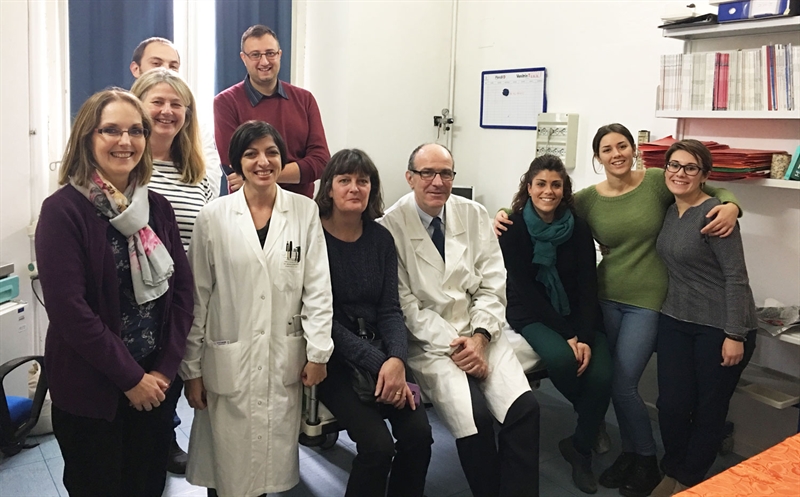Research into SCAD is of paramount importance to everybody affected by SCAD – and is a key component of the Beat SCAD mission: Awareness | Support | Research
Patients, partners and family members alike desperately want to understand why SCAD happens and find ways to predict and prevent SCAD from occurring. Thankfully, more and more research is taking place around the world with many doctors collaborating to bring their ideas and findings together in this quest for answers – all of which brings much hope to the SCAD community.
Dr David Adlam, the lead SCAD researcher at the University of Leicester in the UK and Chair of the European Society of Cardiology – Acute Cardiovascular Care Association (ESC-ACCA) SCAD Study Group, has teamed up with Professor Rosa Maria Bruno, cardiovascular researcher and assistant professor at the Department of Clinical and Experimental Medicine, University of Pisa, to support her study titled FUCHSIA (Very high-Frequency Ultrasonography for arterial phenotyping in patients with Cervico-Cerebral Artery Dissection (CCeAD), Hypertension, Spontaneous Coronary Artery Dissection (SCAD) and Fibromuscular Dysplasia (FMD)). Dr Adlam’s role is to confirm the SCAD diagnosis of each participant.
Professor Bruno’s main field of research is non-invasive evaluation of functional and structural vascular alterations in individuals with traditional and emerging cardiovascular risk factors. The FUCHSIA study aims to recruit 30 SCAD patients, in addition to 30 patients with renal FMD and hypertension, 30 first-degree relatives (FMD-fam group), 30 patients with CCeAD, plus age and gender matched volunteers as control groups for comparison.
Professor Bruno said: “We would like to investigate if we can identify alterations in small arteries which may predispose to SCAD and to other female-specific rare vascular diseases.”
Dr Adlam said: “What they have in Pisa is a very high-frequency ultrasound which means they can get amazing quality pictures of the blood vessels.”
An invitation to participate was extended to the UK SCAD community and so far two groups have travelled to Pisa to undergo assessments by Professor Bruno and her research team.
Beat SCAD Chair Rebecca Breslin participated in December and said: “This was an amazing opportunity to contribute to the ongoing research. Professor Bruno and her team are fantastic and took great care of us. The FUCHSIA study is really interesting, I can’t wait to hear about the findings.”
Andrea provided a summary of her study day: “We arrived at the hospital all together at 9am and met the lovely Professor Bruno who explained everything that was going to happen. Then we all got separated and started doing the various tests with her colleagues: blood pressure measurements in each arm, three times; ultrasound of the neck and groin on both sides and arteries of each arm; a blood pressure cuff was inflated for about five minutes before being deflated to assess blood flow; and then the high-frequency ultrasound where the technician took images of the arteries of my middle finger, arm and neck – everything on left and right. We were finished just before 1pm then ate lunch with Prof Bruno and her team. They are genuinely great people. This was my best hospital trip ever!”
Both groups made the most of their self-funded road trip to Italy, as you can see from the wonderful picture gallery.
Andrea continued: “The highlight for me was to spend some time with Sam, Sarah, Liz and their hubbies. Pisa is amazingly beautiful, everything is within walking distance of what we wanted to do.”
Lucie said: “I could sum up our trip to Pisa in a few words… a worthwhile adventure! We travelled in pairs… It was very reassuring to travel together and a great opportunity to get to know each other. We spent the first afternoon exploring and then had a delicious Italian meal in the evening. We swapped SCAD experiences and shared our stories and soon it felt as if we had known each other for years!”
Frances said: “I jumped at the chance to help with this research project… The day consisted of a rotation of different ultrasound scans, a blood test and a health questionnaire session with Dr Bruno – nothing too onerous but it seemed to take a long time. We then had a lovely lunch and cakes with the team before we said our goodbyes. I would recommend the trip to anyone who gets the chance to go, not least for spending time with fellow SCADsters and sharing experiences.”
Lucie concluded: “It was a wonderful few days, with wonderful new friends, and all for a good cause. I look forward with anticipation to the results of Professor Bruno’s team and I would recommend a trip to Pisa to anyone thinking of volunteering.”
Dr Adlam added: “Thanks to all the Beat SCAD patient volunteers who are helping with this key study. Rosa is generating some fantastic data.”

